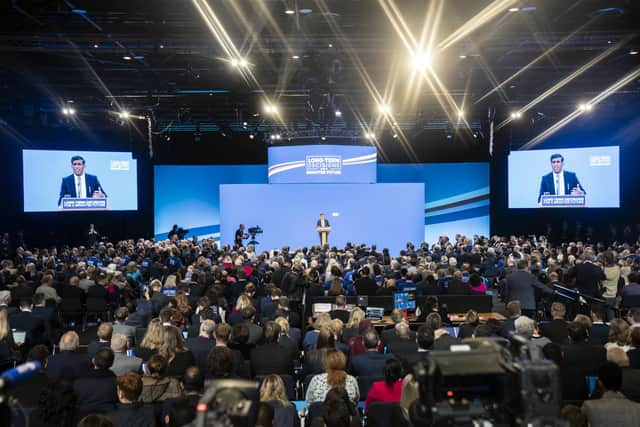The Conservatives are beginning to lose the political initiative on levelling up - Justine Greening
Above all, it was interesting to see the differences between the two major parties. The Conservative Conference was factional with different wings of the party seeking to exert their influence on affairs, whilst the Labour Conference seemed united but also conscious that there is a long way to go and hard political yards to navigate before next year’s General Election. But beyond the state of the parties themselves, when it came to their strategies to change lives for the good of the wider public, my conclusion was that I saw one political party wrongly dialling down its rhetoric and ambition on levelling up whilst the other is now much more sensibly dialling it up.
In practice, the Conservative Party Conference was dominated by whether the Government would stick to its commitment to build the High Speed 2 leg to Manchester. Having trailed the potential cut back of the remaining Northern leg of HS2 to Manchester and with the Yorkshire leg already scrapped last year, the party began its conference unwilling and apparently unable to give a straight answer to a straight question. Though it was clear that a decision had essentially been taken, it took until the final day of the conference - in Manchester - for the Prime Minister to make the ultimate announcement of scrapping the Manchester leg of HS2.
Advertisement
Hide AdAdvertisement
Hide AdIt felt like a huge backward step for levelling up. Earlier this week, the National Infrastructure Commission called the decision ‘deeply disappointing’, and one which it says ‘leaves a major gap in the UK’s rail strategy’ which will result in an ‘overload’ of the west coast mainline, or encourage more people and freight onto the roads. The reality is that the nebulous Network North transport announcement is no substitute. It is not much more than a concept, let alone a full plan.


At the Labour Party Conference in Liverpool, it was hardly surprising that there was a palpable sense of opportunity. With its own infighting much more effectively dealt with, Labour now seems to have a much more clearly defined sense of where it should and wants to position itself to fight the next election. It has also understood that a message and policy agenda on equality of opportunity is crucial for victory. With a shift away from its levelling up mission, Rishi Sunak’s Conservative Party has left the door wide open for the Opposition to begin to set out its own case on social mobility and in a way which it hopes will be more compelling to voters.
Whilst the Labour party’s mission of ‘breaking down barriers’ and smashing the ‘class ceiling’ may be different rhetoric to levelling up, the overall objective is the same - driving equality of opportunity for everyone, everywhere. In my own campaigning on social mobility, in the past year, I’ve seen a noticeably greater engagement from Labour both on the policy idea front and also a welcome recognition on how much work is happening outside of Westminster, in particular with employers around the country. As Shadow Employment Minister Alison McGovern recently commented, ‘private is ahead of public’ when it comes to employers innovating on driving social mobility.
The big strategic risk for the Conservatives was always to lose the political initiative on levelling up. That is now happening.
Advertisement
Hide AdAdvertisement
Hide AdThe one bright spot for Mr Sunak is that Sir Keir Starmer’s Labour Party has by no means sealed the deal with the electorate. Poll after poll show that there is still a heavy dose of ambivalence and scepticism towards Labour that is reflective of a wider world-weariness with politics for voters more generally. Yet we will see whether Rishi Sunak is able to develop any sort of political strategy and credible offer that gives people what they need.
The political parties that win elections are those that people feel offer them some hope for the future and support their aspirations. Margaret Thatcher and Boris Johnson’s landslide victories were both built on that foundation of social mobility. John Major won narrowly in 1992 on the back of aspiration-driving campaign posters that said “What does the Conservative Party offer a working class kid from Brixton - it made him Prime Minister.” Tony Blair’s 1997 landslide victory was as a Labour leader who said his three priorities were “education, education, education”.
Mr Sunak comes across as wanting to separate himself from Boris Johnson and his ’levelling up’ agenda. In his conference speech, he drew parallels between himself and Margaret Thatcher. Yet both Thatcher and Johnson won through being in touch with the political zeitgeist of the day of where the country should go next. Both fundamentally ran on a promise of greater social mobility and access to opportunity.
What we need from our political leaders in these challenging times is some sense of real hope for the future. We need a message that in spite of how difficult a time this has been for Britain, we can get beyond it and emerge stronger, fairer and more united than before. Real hope will only come from tangible proposals and a credible roadmap for us all to believe things can change for the better. With their party conferences behind them, both parties now have the coming months to flesh out their election offer to the British public. And the one that ultimately wins the day will be the one that wins voters over on who is best placed to deliver greater equality of opportunity.
Justine Greening is a former Secretary of State for Education.